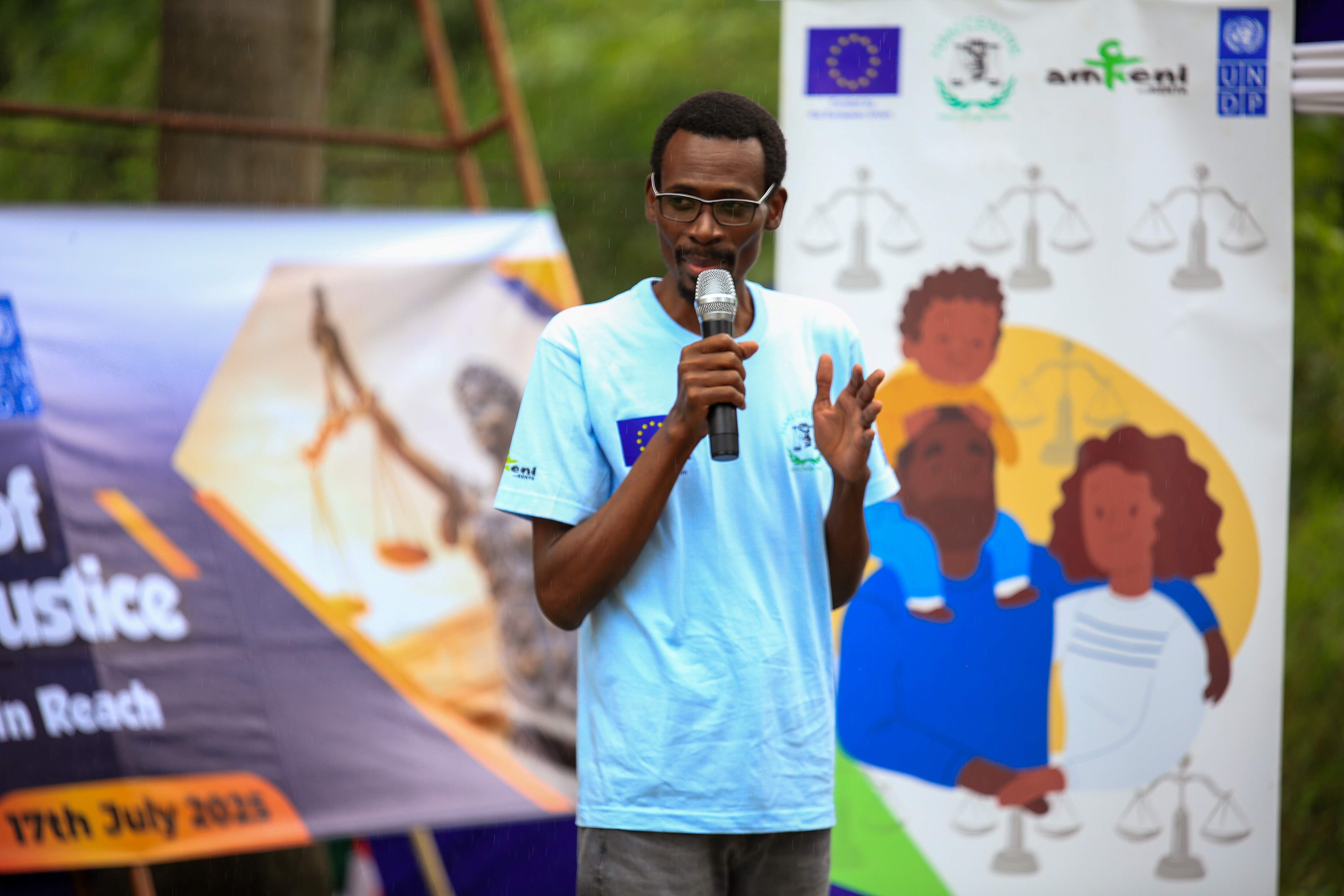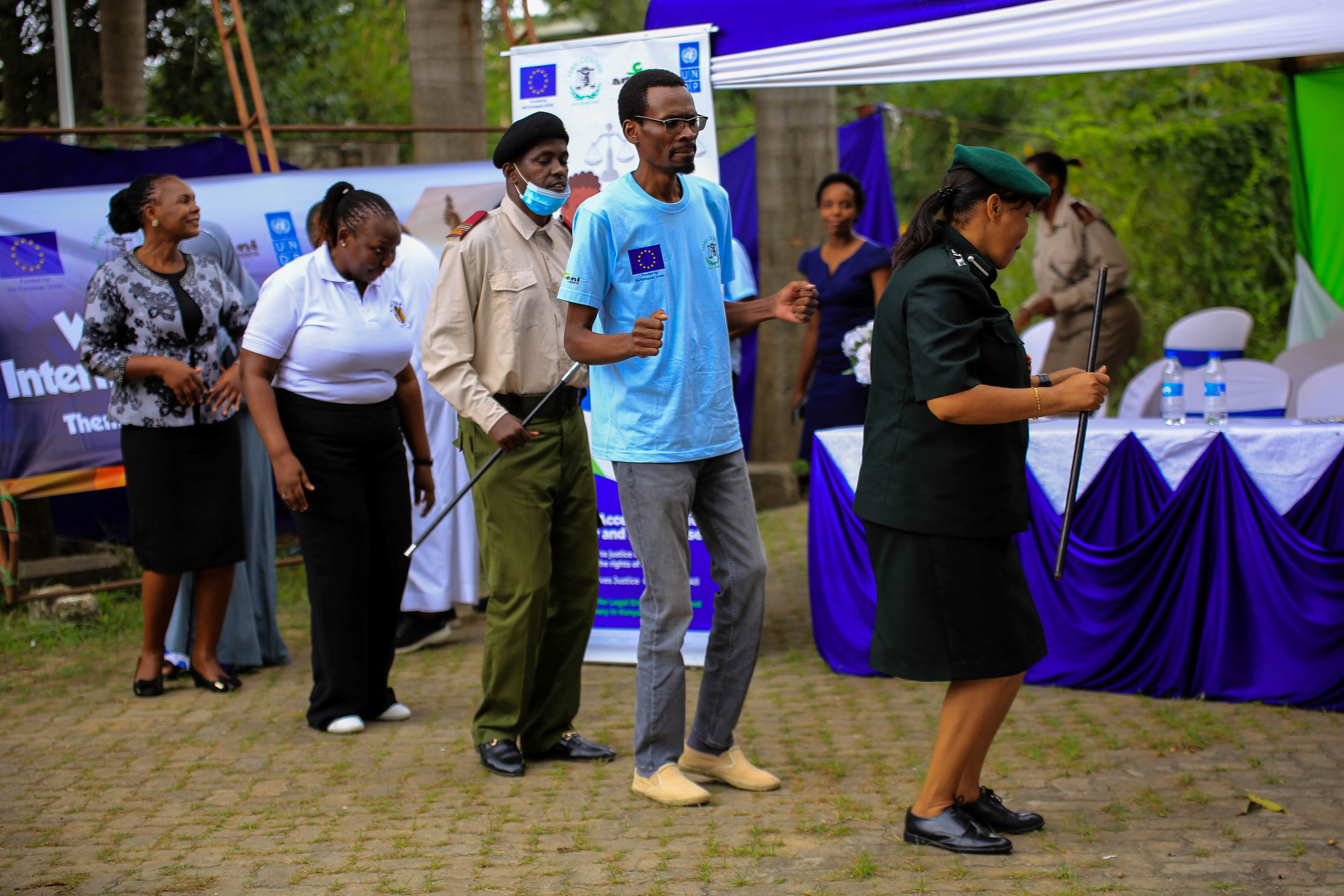
Haki Centre programs controller Andrew Ochola in Bamburi on Saturday / BRIAN OTIENO
Land injustice, gender-based violence and family conflicts are some of the vices affecting peace and security inn Kisauni, a rights organisation has said.
Haki Centre Organization said this, coupled with the lack of knowledge on how the justice system works, has worsened crime in the sub-county.
It said the situation has made many families break, maimed and killed many others, giving rise to the number of orphaned children.
Programme officer Andrew Ochola said they are working to reverse the situation through sensitisation programmes that empower residents to access justice and self-litigate.
He said many residents do not even know what constitutes a crime, especially with regards to sexual and gender-based violence.
“This could be the reason why many SGBV crimes go unreported,” Ochola said.
He spoke during commemoration of the International Day of Justice.
The organisation has been working on the project for two years, implementing a programme with the Program for Legal Empowerment and Aid Delivery.
He said the introduction of Alternative Dispute Resolution committees in Kisauni subcounty has helped reduce the number of cases on land, SGBV and family conflicts taken to courts.
This has ensured the legal system is not overwhelmed and cases are not dispensed faster.
At least more than 50 paralegals from parts of Kisauni can now self-represent in court and also initiate public interest litigations.
He said the land, SGBV and family conflicts are more rampant in Junda and Mwakirunge because of high poverty levels.
“Land, GBV, Family conflicts (inheritance) and employment related cases come up most frequently and have either been resolved here or referred to our partners within the referral pathways,”Ochola said.
Most communities have a problem accessing the legal and criminal justice system because of the costs involved and the time.
Ocholla said in such cases, they provide two options; alternative dispute resolution and formal justice.
“We listen to their cases and in a situation where it is something that can be addressed through alternative justice, our paralegals listen to them try to help them resolve.
“If it is something that has to go to court, we use our advocates to try to help wherever they can and sometimes we refer those cases to national legal aid services handlers and actors like Kenya National Commission on Human Rights,” Ochola said.
He said their main aim is to sensitise the community to understand their rights and provide legal empowerment to them.
“We train them to understand how the legal system works and how they can access it. We also train them for self-representation which is where they understand what needs to be done for a given case, the process that is involved and how they can address issues on their own,” Ochola said.

Haki Centre programs controller Andrew Ochola [2ND
R] in Bamburi on Saturday / BRIAN OTIENO
Land injustice, gender-based violence and family conflicts are some of the vices affecting peace and security inn Kisauni, a rights organisation has said.
Haki Centre Organization said this, coupled with the lack of knowledge on how the justice system works, has worsened crime in the sub-county.
It said the situation has made many families break, maimed and killed many others, giving rise to the number
of orphaned children.
Programme officer Andrew Ochola said they are working to reverse the situation through sensitisation programmes that
empower residents to access justice and self-litigate.
He said many residents do not even know what constitutes a crime, especially with regards to sexual and gender-based violence.
“This could be the reason why many SGBV crimes go unreported,” Ochola said.
He spoke during commemoration of the International Day of Justice.
The organisation has been working on the project for
two years, implementing a programme with the Program for Legal Empowerment and Aid
Delivery.
He said the introduction of Alternative Dispute Resolution committees in Kisauni subcounty has helped reduce the number of cases
on land, SGBV and family conflicts taken to courts.
This has ensured the legal system is not overwhelmed
and cases are not dispensed faster.
At least more than 50 paralegals from parts of Kisauni can now self-represent in court and also initiate public interest litigations.
He said the land, SGBV and family conflicts are
more rampant in Junda and Mwakirunge because of high poverty levels.
“Land, GBV, Family conflicts (inheritance) and
employment related cases come up most frequently and have either been resolved here
or referred to our partners within the referral pathways,”Ochola said.
Most communities have a problem accessing
the legal and criminal justice system because of the costs involved and the time.
Ocholla said in such cases, they provide two options; alternative dispute resolution and formal justice.
“We listen to their cases and in a situation where
it is something that can be addressed through alternative justice, our
paralegals listen to them try to help them resolve.
“If it is something that has to go to court, we use
our advocates to try to help wherever they can and sometimes we refer those cases
to national legal aid services handlers and actors like Kenya National
Commission on Human Rights,” Ochola said.
He said their main aim is to sensitise the community
to understand their rights and provide legal empowerment to them.
“We train them to understand how the legal system works and how they can access it. We also train them for self-representation which is where they understand what needs to be done for a given case, the process that is involved and how they can address issues on their own,” Ochola said.











